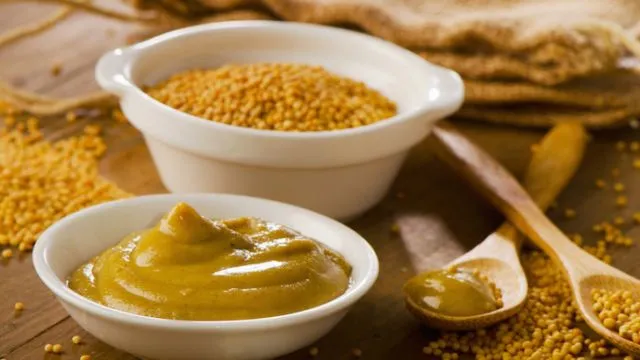
- Share on Facebook14
- Share on Pinterest
- Share on Twitter
For most of us, mustard is merely a zesty condiment for hot dogs and juicy bratwurst sausages, or one of the ingredients in a salad dressing. You might think that this is all mustard has to offer. In fact, mustard is a versatile ingredient with many health benefits. Here are six reasons to include mustard in your diet.
- It promotes a healthy heart
Many mainstream cooking oils out there, vegetable oil and margarine included, are chock-full of unhealthy omega-6 fatty acids and various other compounds that undermine our health and put our hearts at risk. Not so with mustard oil, which should be your next solution when it comes to cooking.
A study that examined the effects of both mustard oil and fish oil on patients with suspected acute myocardial infarction (heart attack, in layman’s terms) found that both oils were associated with a significant reduction in total cardiac arrhythmias, left ventricular enlargement, and angina pectoris compared with a placebo group. Researchers concluded that this benefit may be a result of a reduction in oxidative stress brought on by consuming mustard oil, on account of the high concentrations of omega-3 fatty acids.
The takeaway? Mustard oil = good for the heart. Just make sure you don’t use too much of it at one time — it’s potent stuff!
- It fights cancer
Similar to other vegetables in the brassica family, mustard seeds contain a healthy portion of body-boosting glucosinolates, a type of phytonutrient that helps to ward off certain cancers, including cervical cancer, colon cancer, and cancer of the bladder.
Once in your system, these powerful phytonutrients transform into isothiocyanates with the aid of myrosinase enzymes (also, rather conveniently, contained in mustard seeds), which then work to prevent the growth of potentially cancerous cells and even stop them from forming in the first place.
- It beats colds and clears sinuses
Like many things that cause your eyes to water when you eat them (aside from those that have simply expired in the fridge!), mustard is a powerful weapon against colds and sinus congestion. Mustard seeds are a super-effective decongestant, helping to clear mucus from your air passages, and letting you breathe easier. Not only that, simply gargling with a tea made from mustard seeds can banish a sore throat and clear your head.
- It relieves joint and muscle pain
Mustard contains high levels of both selenium and magnesium, two nutrients that have anti-inflammatory and temperature-raising abilities. These properties mean that mustard can be used topically to relieve painful or swollen joints, muscles and ligaments, and the symptoms associated with arthritis. A paste containing mustard can be applied directly to the affected area for a few minutes for pain relief. Or you can heat things up even more by creating a bundle of mustard seeds with muslin or cheesecloth and running a hot bath — either soak your whole body or your feet in the bath.
- It lowers cholesterol
We discussed earlier the heart-protecting power of mustard. Well, it gets better. It turns out, the greens from mustard can also lower your cholesterol levels, courtesy of their high niacin content. Also known as vitamin B3, the niacin contained in mustard greens not only helps to lower heart-damaging LDL cholesterol, it also protects your arteries from plaque buildup, regulates blood flow, and safeguards your body against hypertension.
- It encourages a healthy head of hair
Mustard oil is loaded with vitamins and minerals that promote healthy hair growth, including iron, calcium, magnesium, and of course, omega-3 fatty acids. Its high concentrations of beta carotene make it a particularly useful ingredient when it comes to hair loss or slow hair growth. When beta carotene is converted by your body into vitamin A, your hair reaps the rewards.
The most efficient way to ensure your hair gets all these benefits? We’d suggest massaging a small amount of mustard oil into your scalp then applying a warm, damp towel to increase absorption of the mustard oil into the scalp. Leave it in for anywhere between five minutes and 30 minutes (the oil can get pretty darn hot after a while!), then wash it off with a natural shampoo of your choice.
Remember, mustard is potent stuff, so be careful what you do with it! Always exercise caution, and if in doubt, consult an expert.
—Liivi Hess
- Share on Facebook14
- Share on Pinterest
- Share on Twitter

